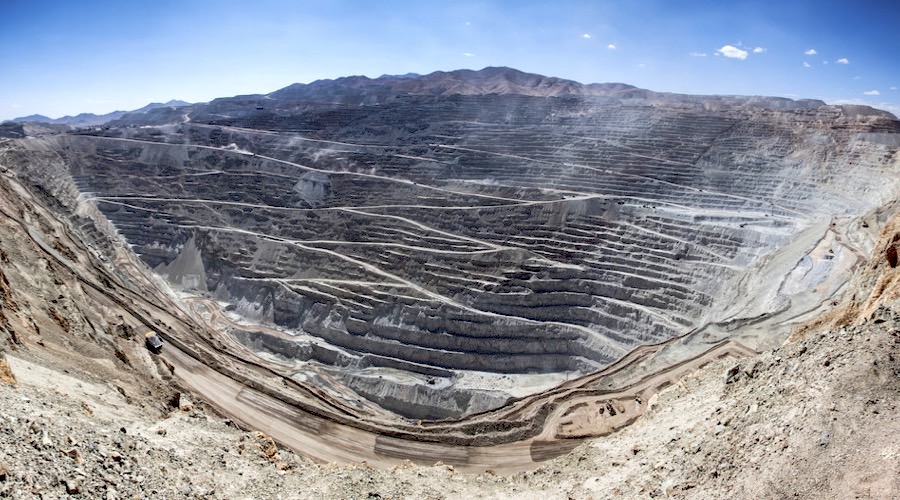Whoever wins Presidential election, Chile state copper giant may get boost

The world’s largest copper miner, Codelco, may see a boost in investment cash regardless of who wins next month’s presidential runoff in Chile, as both candidates have vowed to end the state-run firm’s funding of the military.
Conservative front-runner Sebastian Pinera and his center-left rival Alejandro Guillier, set to face off in the Dec. 17 vote, have both pledged to overturn the dictatorship-era law that transfers to the military 10 percent of Codelco’s export sales, worth $866 million last year.
There is no guarantee that Codelco, which delivers all its profits to the state, would keep the funds should the law be overturned. That decision would ultimately lie with Congress.
But the candidates’ rare agreement that the tax should be eliminated bodes well for the cash-strapped miner, which needs to invest an estimated $20 billion to revamp its aging mines, expand abroad and keep output flowing.
“This tax affects the competitiveness of Codelco, its ability to finance its operations and investments and its possibilities to grow internationally,” Guillier, a senator and former journalist, wrote in a proposal describing his plans for Chile’s mining industry.
Billionaire businessman Pinera, who served as president between 2010 and 2014, has likewise criticized the law, calling for a new formula for financing that would increase Codelco’s autonomy and stabilize its finances in the long-term.
Conservative front-runner Sebastian Pinera and his center-left rival Alejandro Guillier have both pledged to overturn a dictatorship-era law that transfers to the military 10% of Codelco’s export sales.
A Codelco spokeswoman said the company would not comment on how the funds might be used ahead of any change in the law.
Codelco, which ships around two-thirds of its copper to Asia, was the world’s top copper producer based on its annual output to June 2017, according to rating agency Moody’s.
But it has been hard-hit by a downturn in copper prices in recent years, and declining ore grades at its mines.
Those factors, alongside the punitive tax, have left the miner hamstrung, said Juan Carlos Guajardo, of Chilean mining consultancy Plusmining.
“It’s a 10 percent royalty. Ask any mining company and they’ll tell you the same thing. It’s asphyxiating, it’s brutal,” he said.
The law dates back to 1958 and was overhauled in 1976 under former dictator Augusto Pinochet to fund the growing military.
DIFFERENT APPROACHES
The next Chilean president, who will take over from President Michelle Bachelet in March and will have a strong hand assembling Codelco’s board, will weigh heavily on the company’s investment plans.
Though the candidates agree that the military funding law should be eliminated, they differ on what Codelco’s priorities should be.
Pinera, who has been skeptical of Codelco’s management and says he would like to see greater emphasis on efficiency, has called for a “realistic investment plan” and for “maximizing performance of existing assets.”
Guillier, who hails from the northern mining province of Antofagasta, has emphasized new investment and prioritized company-worker relations, similar to Bachelet.
But his plans could be swayed by negotiations with the leftist Frente Amplio bloc, which garnered a larger-than-anticipated share of the vote in Sunday’s first-round presidential and Congressional elections .
The Frente Amplio has called for the recapitalization of Codelco, and mining royalties worth billions of dollars to pay for increased social spending.
Codelco, which produced 1.7 million tonnes of copper in 2016, has a five-year investment plan that includes construction of a new level at its century-old El Teniente mine and expansion at Radomiro Tomic. Both were delayed last year as a result of the copper price slump.
The company is also eyeing projects as far off as Mongolia, though the dip in copper prices forced it to slash its exploration budget by 47 percent last year.
Some in Chile are skeptical about the chances of the military funding law being repealed. Repeated attempts to overturn it in the past have failed, scuttled by supporters of the politically powerful military.
“I’m not very optimistic … because we’ve been talking about it for 25 years,” said Gustavo Lagos, a mining professor with the Universidad Catolica.
(Reporting by Dave Sherwood and Fabian Cambero; Editing by Daniel Flynn and Rosalba O’Brien)
More News
Contract worker dies at Rio Tinto mine in Guinea
Last August, a contract worker died in an incident at the same mine.
February 15, 2026 | 09:20 am
{{ commodity.name }}
{{ post.title }}
{{ post.date }}




Comments